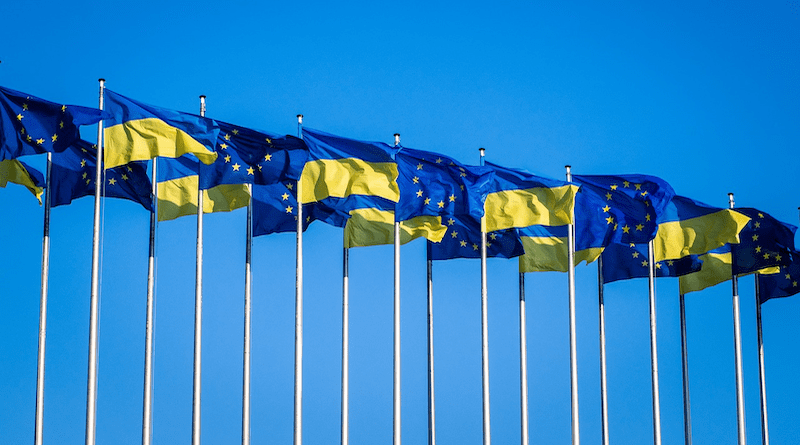European Commission Recommends Accession Talks With Ukraine, Moldova
By EurActiv
By Alexandra Brzozowsk
(EurActiv) — In a boost for the bloc’s floundering enlargement process, the European Commission recommended on Wednesday (8 November) opening accession talks with Ukraine and Moldova – as well as potentially Bosnia, at a much later stage – once they finalise implementing key outstanding reforms.
“In light of the results achieved by Ukraine and Moldova, and of the ongoing reform efforts, the Commission has recommended that the Council opens accession negotiations with both countries,” the EU’s executive announced.
The recommendation to open negotiations with Ukraine and Moldova is “unconditional”, EU officials have confirmed.
The talks should formally be launched once Kyiv satisfies the remaining conditions related to stepping up the fight against corruption, adopting a law on lobbying in line with EU standards and strengthening national minority safeguards, it added.
“Ukraine continues to face tremendous hardship and tragedy provoked by Russia’s war of aggression, and yet the Ukrainians are deeply reforming their country, even as they are fighting a war that is existential for them,” European Commission President Ursula von der Leyen told reporters in Brussels.
Echoing her positive assessment from last weekend, von der Leyen said Ukraine had completed “well over” 90% of the necessary steps outlined by the EU’s executive last year, pointing to judicial reforms and anti-corruption efforts.
“On the functioning of the judiciary, Ukraine has some level of preparation and must continue its efforts,” the Commission report notes, while “on the fight against corruption, Ukraine has some level of preparation.”
“The remaining reforms are already on their way, that’s good, and the commission commends these efforts (…) and on this basis, we have recommended today that the council opens accession negotiations,” von der Leyen said.
The European Commission made a similar recommendation for Moldova, which EU officials have described as the “frontrunner” in terms of the speed of reforms required for full alignment with the EU.
“On the political criteria, Moldova has continued reform efforts to strengthen democracy and the rule of law despite multiple challenges linked to Russia’s war of aggression against Ukraine,” the report notes.
According to the European Commission’s report, Chisinau still needs to fulfil three of its outstanding nine recommendations, including the need to finalise judicial reforms introduce further anti-graft measures, and make progress with economic indicators.
The next step will be for EU leaders to back the Commission’s enlargement recommendation when they meet for their regular summit on 14-15 December.
Euractiv understands that if there is a political agreement and green light in December, the technical preparatory work on a negotiating framework will start immediately and the EU’s executive will send its negotiating teams to Kyiv and Chișinău right away.
The progress assessment of the fulfilment of the outstanding recommendations for both Ukraine and Moldova will be communicated to EU leaders in March 2024, EU officials confirmed.
The EU’s screening process will assess which laws need to be aligned with the bloc’s current legislation, the so-called acquis.
The screening process normally takes between one and two years. “But we want to go fast and think we can do this in six months,” an EU official told reporters.
According to some EU officials with knowledge of the matter, the first Intergovernmental Conference (IGC) – at least for Ukraine – could be held shortly after March 2024.
The EU executive also said it stands ready to back the start of accession talks for Bosnia and Herzegovina – along with Kosovo the only one of the six Western Balkan candidate countries not yet in official talks – “once the necessary degree of compliance with the membership criteria is achieved”.
“We open the door very wide. We invite Bosnia and Herzegovina to go through the door,” von der Leyen said when asked about why there are conditions set to start negotiations.
Bosnia remains troubled by ethnic divisions that have dominated local politics since the 1992-95 ethnic war and have slowed down political reforms. Brussels has expressed concern about the justice system and other rights failures in the Bosnian Serb part of the country.
The European Commission also recommended upgrading Georgia to official EU candidate status, though it has to further meet certain conditions, seventeen months after it was named a ‘potential candidate’.
“Enlargement is a vital policy for the European Union. Completing our Union is the call of history, the natural horizon of our Union,” von der Leyen said.
“Past enlargements have shown the enormous benefits both for the accession countries and the EU. We all win,” von der Leyen added. The last country to join the EU was Croatia in 2013.

